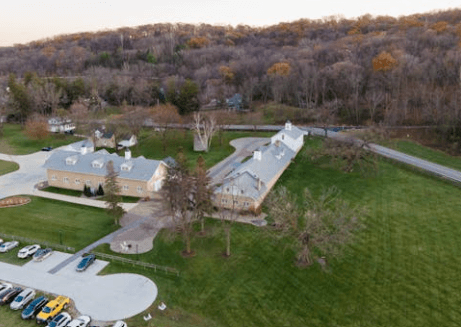A residential lot is a vital piece of land for building homes and creating living spaces. But what is a residential lot? It’s a designated area reserved for housing, whether for a single-family home or a larger residential project based on zoning laws. Over the years, the average lot size in the U.S. has shrunk dramatically—from 18,760 square feet in 1978 to just 13,896 square feet in 2020. It is crucial to understand what defines a residential lot and its value in today’s market. If you’re exploring buying, selling, or investing, turn to Steve Daria and Joleigh, trusted real estate investors and cash buyers, for expert insights and guidance. Still asking yourself, “What is a residential lot?” Book a free discussion with Steve Daria and Joleigh today to evaluate your options and take the next step confidently!
Key Points
- Definition and Purpose: A residential lot is a piece of land designated for building homes. Depending on zoning rules, it is meant for residential purposes, such as single-family houses or even small apartment buildings.
- Zoning Laws Matter: The way a residential lot can be used is often determined by the area’s zoning laws. These rules outline whether you can build a single home or multiple units or add extra features like a detached garage.
- Size of Residential Lots: Residential lots can vary greatly depending on location. The average lot size in the U.S. has shrunk significantly, dropping from 18,760 square feet in 1978 to 13,896 square feet in 2020, driven by population growth and limited space availability.
- Investment Potential: A residential lot is not just a potential home site; it’s also an investment. Many buyers see it as an opportunity to develop property that could grow in value over time, especially in high-demand areas.
- Work with Experts: If you’re buying, selling, or investing in a residential lot, it helps to work with experts. Steve Daria and Joleigh, experienced real estate investors, can guide you through the process and help you make smart decisions for your property goals.
What is a residential lot used for?
A residential lot is primarily used for building homes and establishing living spaces for individuals and families.
Depending on the size and zoning regulations, it serves as the foundation for constructing single-family houses, duplexes, townhomes, or even larger housing developments.
Beyond building a house, a residential lot can also be utilized to add features like gardens, driveways, patios, or even landscaping to create a comfortable and functional living environment.

Residential lots can be turned into custom homes designed just for you, creating a private and personalized space that fits your needs and style perfectly.
These lots are particularly important for developing neighborhoods and communities, as they provide the land for houses that form any residential area.
Additionally, homeowners can use these lots to install utilities or improve their property, such as adding a pool or installing solar panels.
For buyers, investors, and developers, understanding “What is a residential lot?” is essential to determine its potential and value.
Overall, residential lots are critical for housing and offer personal and community development flexibility.
Get Started: Get Your Cash Offer Below…
We are direct land buyers. There are no commissions or fees and no obligation whatsoever. Start below by sharing where your property is and where we can send your offer…
How is a residential lot different from other types of land?
A residential lot differs from other types of land because it is specifically intended for building homes and living spaces.
Unlike commercial land, used for business properties, or agricultural land, preserved for farming and livestock, residential lots are designated for private housing.
One key distinction is zoning laws, which strictly apply to residential lots to ensure they are used for residential purposes only and meet local guidelines.
Residential lots are often located in neighborhoods or communities, providing access to schools, parks, and amenities designed to support daily living.
They are usually smaller than agricultural or industrial land and are designed to meet the needs of individual homeowners.
Additionally, residential lots usually have access to utilities like electricity, water, and sewer systems, which are essential for building and living comfortably.
When considering “What is a residential lot?” it’s important to understand the purpose and features that set it apart from other types of land.
These distinctions make residential lots ideal for creating stable and welcoming environments for families and communities.
How do I know if a residential lot is right for me?
1. Consider Your Housing Goals
Think about the type of home you want to build and whether a residential lot meets those needs.
Residential lots are perfect for single-family homes, duplexes, or custom-built properties.
Asking yourself, “What is a residential lot?” can help clarify whether it aligns with your vision for a home.
2. Evaluate the Location
The location of a residential lot plays a big role in deciding if it’s right for you.
Is it close to schools, workplaces, or amenities like parks and grocery stores?
Understanding “What is a residential lot?” regarding its location and surroundings is crucial for a smart choice.
3. Check the Zoning and Regulations
Zoning laws define how residential properties can be used and outline what structures can be built on them.
If the lot is zoned strictly for single-family homes and you want to develop multiple units, it may not be the best fit.
Researching “What is a residential lot?” will help you understand these rules and avoid surprises.
4. Assess the Utilities and Infrastructure
Residential lots are often equipped with access to water, electricity, and sewer systems, which are important for building a home.
Ensure the lot has the utilities and infrastructure you need for your plans.
This will ensure you’re not taking on extra costs later to add basic services.
5. Think About Your Budget
Budgeting is key when deciding if a residential lot is right for you.
Consider the lot’s price, the costs to build your home, and other expenses like permits and taxes.
If the numbers add up and match your resources, this could be the perfect opportunity.

What factors affect the value of a residential lot?
Several factors can affect the value of a residential lot, and understanding them is essential when buying or selling.
One of the most important factors is location. If the lot is close to schools, shopping centers, parks, or public transportation, it’s likely to be more valuable.
Zoning regulations and allowed land uses also play a big role in determining what you can build on the lot.
Another factor is the size and shape of the lot since larger or well-shaped lots often offer more flexibility for construction and design.
The availability of utilities like water, electricity, and sewer systems adds value, as lots with access to these are generally more desirable.
Surrounding neighborhood conditions, including the quality of nearby homes and safety, also impact the lot’s worth.
Additionally, the land’s topography, such as flat or sloped, can influence construction costs and, in turn, the lot’s value.
When asking yourself, “What is a residential lot?” it’s helpful to consider all these elements, as they affect both its usability and market price.
What documents or permits are required to buy or sell a residential lot?
- Deed of Ownership: This legal document proves ownership of the residential lot. It must be transferred to the buyer during the sale to officially complete the ownership change.
- Purchase Agreement: This contract explicitly outlines the terms and conditions of a sale between the buyer and the seller. It includes details like the price, payment terms, and closing date, ensuring both parties agree on everything before completing the transaction.
- Zoning and Land Use Permits: These permits confirm that the residential lot complies with local zoning regulations. They are especially important if the buyer plans to develop the lot or change its use.
- Tax Records and Clearance: Proof of up-to-date property tax payments is essential during the sale process. Buyers typically want to ensure there are no outstanding tax debts on the property before purchasing it.
- Title Insurance or Title Policy: Title insurance protects the buyer against potential legal issues or disputes related to the ownership of the lot. It confirms the seller is legally allowed to sell the property and ensures there are no hidden claims on the land.
What steps should I take before buying a residential lot?
Before buying a residential lot, you should take several key steps to make a smart investment.
First, research the location to ensure the area meets your needs, whether for building a home or future resale value.
Next, assess the zoning and land use regulations to confirm that the lot suits your intended purpose.
Check if utilities like water, electricity, and sewer systems are available, as this can impact construction and living costs.
Review the property’s history and ensure no legal issues, such as disputes or unpaid taxes.
It’s also important to calculate your budget, factoring in the cost of the lot, permits, and potential development expenses.
Don’t forget to understand “What is a residential lot?” so you can evaluate its best features and potential thoroughly.
For expert guidance, you can consult seasoned real estate investors like Steve Daria and Joleigh, who specialize in purchasing land for cash and have extensive experience navigating the real estate market.
Reach out to them for trusted advice before making your final decision!
**NOTICE: Please note that the content presented in this post is intended solely for informational and educational purposes. It should not be construed as legal or financial advice or relied upon as a replacement for consultation with a qualified attorney or CPA. For specific guidance on legal or financial matters, readers are encouraged to seek professional assistance from an attorney, CPA, or other appropriate professional regarding the subject matter.
